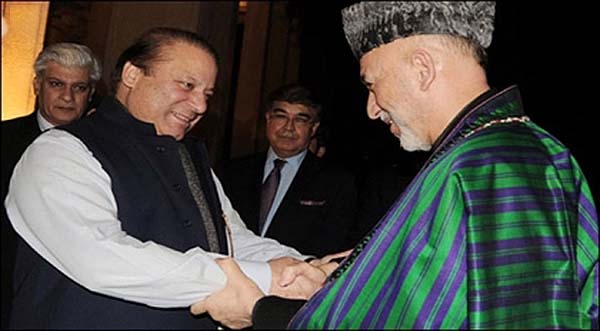Afghan and Pakistani leaders are to meet in London to discuss the troubled relations between the two countries, and possibly, find a common ground for taking concrete measures on the stalled peace process in Afghanistan. The trilateral summit, hosted by British Prime Minister David Cameron, will focus on economic and security issues as well as joint anti-terrorism efforts in both countries. The session is being held at a time when Pakistan and Afghanistan’s relations are specifically affected the Afghan government’s peace efforts and the ambiguity surrounding Mullah Baradar’s release. Afghan officials have said that the Afghan president will raise the issue of Mullah Baradar, who reportedly was released from Pakistan's prison, but still there are ambiguities regarding his whereabouts.
In their London talks, both Hamid Karzai and Nawaz Sharif are sitting on negotiations from an awkward position while both in difficult situations due to internal politics. Pakistan’s Prime Minister Nawaz Sharif is facing serious internal challenges both from the militant groups and the country’s teetering economy. In a landslide election some months ago, he was elected as prime minister of Pakistan, enjoying a rare position of strength and support for a Pakistani civilian leader to make policies and moving forward for salvaging Pakistan from a dire situation. But, Sharif’s honeymoon soon was over, and he prematurely faced real politics of Pakistan. His policy of negotiating with Pakistani Taliban has been stumbling, while Pakistan is grappling with a worsening economy and a very serious shortage of energy.
Despite Pakistan’s new government’s efforts to maintain peace and security in the country and initiate talks with Pakistani Taliban, the militant groups in the country have been waging a deadly war since Nawaz Sharif has come to power. The increasing trend of violence in Pakistan has raised serious questions on Pakistan’s initiative for talks with the Tehrik-e Taliban Pakistan and its affiliate groups. Therefore, the Pakistan’s civil government seems to maintain the priority to engage with Afghanistan in jointly fighting the militant groups on both sides of the border.
In Afghanistan, Hamid Karzai, who is currently overseeing a presidential election, is set to transfer power to his successor next spring. He is urgently trying to find a way of cooperation with Pakistan on the stalled process of peace in Afghanistan that could conclude a peace deal with Taliban before his term ends. During his August visit to Islamabad, Hamid Karzai had received promises from Pakistan’s Nawaz Sharif to cooperate and sincerely support the Afghan-led peace efforts. However, now both leaders are to meet in London on Wednesday with the previous agreements in their Islamabad negotiations going nowhere. The Afghan president is feeling Pakistan’s leader has again failed to make the promises he made in their August negotiations in Islamabad.
This makes the negotiations considerably uneasy for the two leaders. The two leaders are set to meet and talk on the issues they had discussed in their previous meeting during President Karzai’s visit to Islamabad. The Afghan government believes Pakistan’s Premier has good intentions regarding the Afghan peace efforts. This suggests that the government of Afghanistan has maintained optimisms that Sharif would make his promises right and his government play a key role for peace in Afghanistan. However, these optimisms may not last forever, if Pakistan’s fails to convincingly cooperate with the Afghan government for bringing Taliban leaders to negotiation table. If the two countries fail to tailor a pragmatic plan for working on peace in Afghanistan, they will soon begin to criticize each other for the failures.
The current course of cooperation and talks between the two sides is promising. Nawaz Sharif's government policy regarding Afghanistan conflict has helped the two countries to start talking on the ways for release of the Taliban leaders and encouraging the militants’ leaders to come to negotiations table. Pakistan's government has assured Afghanistan of a new a cooperative role in the Afghan peace talks with the leaders of the insurgent groups. After recent moves by Pakistan to release Taliban’s senior leader and the once second-in-command, Mullah Abdul Ghani Baradar, the Afghan government has expressed optimisms on Pakistan’s new approach towards the Afghan peace initiative.
Despite that relations between Afghanistan and Pakistan have considerably improved since Nawaz Sharif came to power in Islamabad, it seems that Afghanistan and Pakistan is once again on a track of failure if they fail to develop the initial cooperation further. The Afghan peace initiative is focused on Mullah Baradar’s release is remaining a sensitive issue between the two countries, with both sides showing distrusts towards each others. Despite initial optimisms towards Pakistan overtures and good-will gestures to the Afghan peace process, skepticisms has been reemerging recently after reports that Pakistan is still keeping Mullah Baradar in holding. A Taliban spokesman also claimed recently that Mullah Baradar has not been released and remained in Pakistan’s detention center with deteriorating health conditions.
It is quite a possibility that Baradar’s issue may remain an unresolved source of prolonged tensions between the two countries as the two sides do not find a common way on fate of the Taliban’s senior leader. The Afghan government is maintaining persuading Pakistan to establish a contact channel between the government of Afghanistan and the Taliban’s senior leader, as it believes is under control. Though a breakthrough is not expected from Karzai and Sharif’s talks in their London summit, the two leaders still have the opportunity to explore a common ground for making progress in their troubled relations and particularly the deteriorating interconnected security situation in both countries. Therefore, the London summit is a test for both leaders to improve bilateral relations or make another failure.
